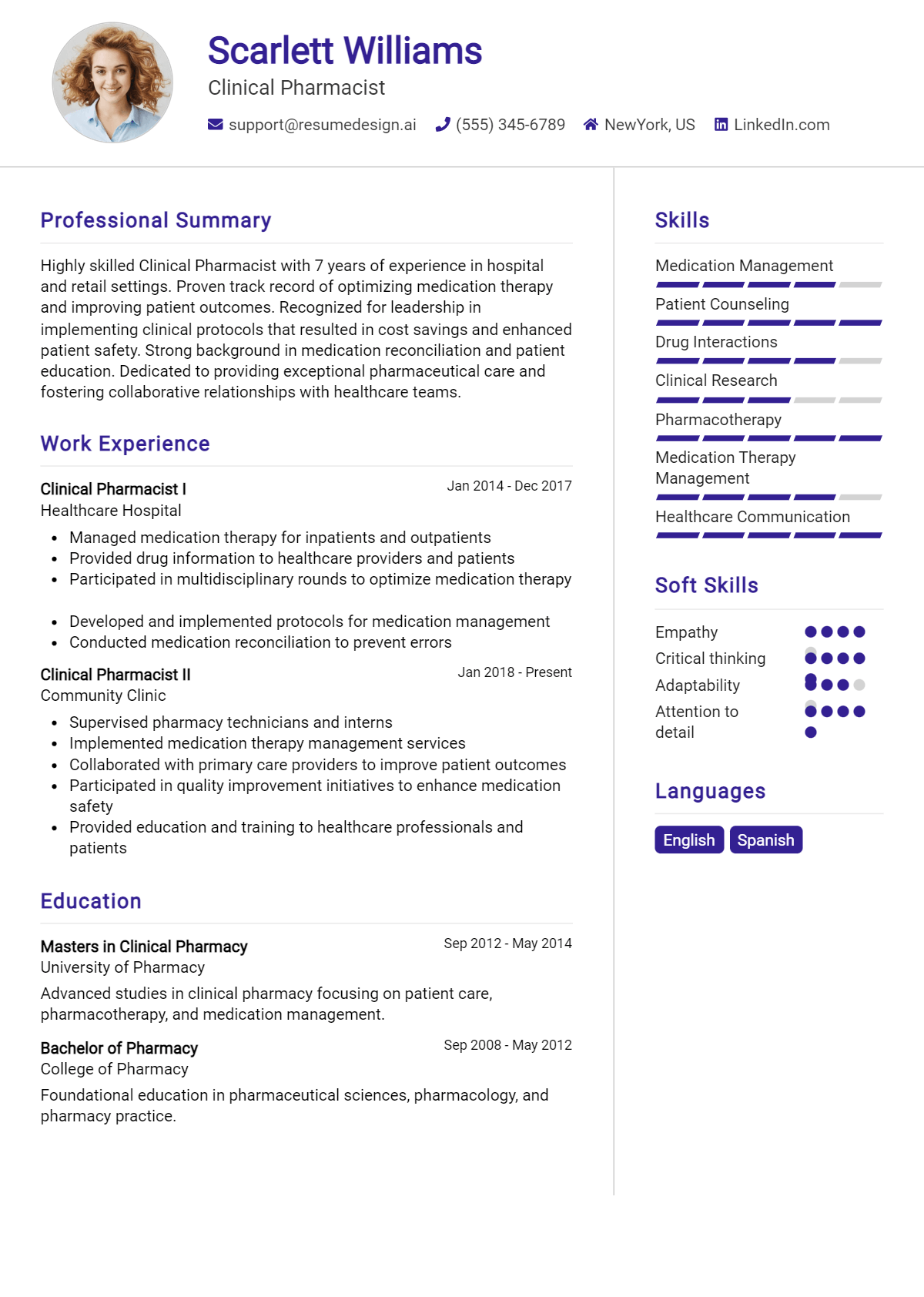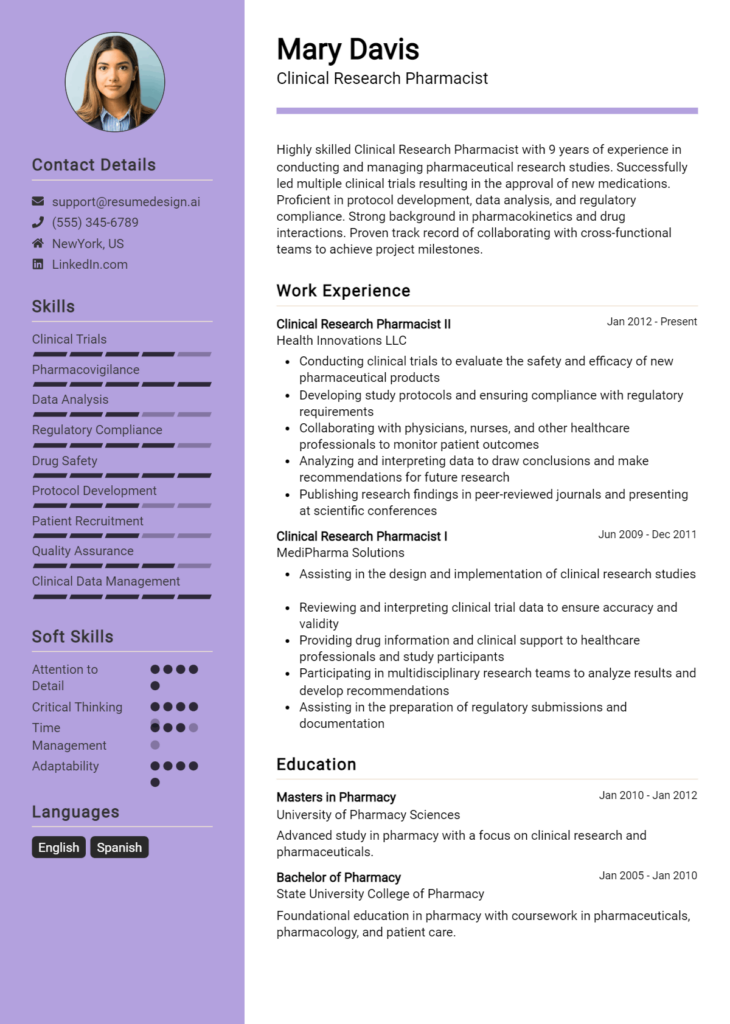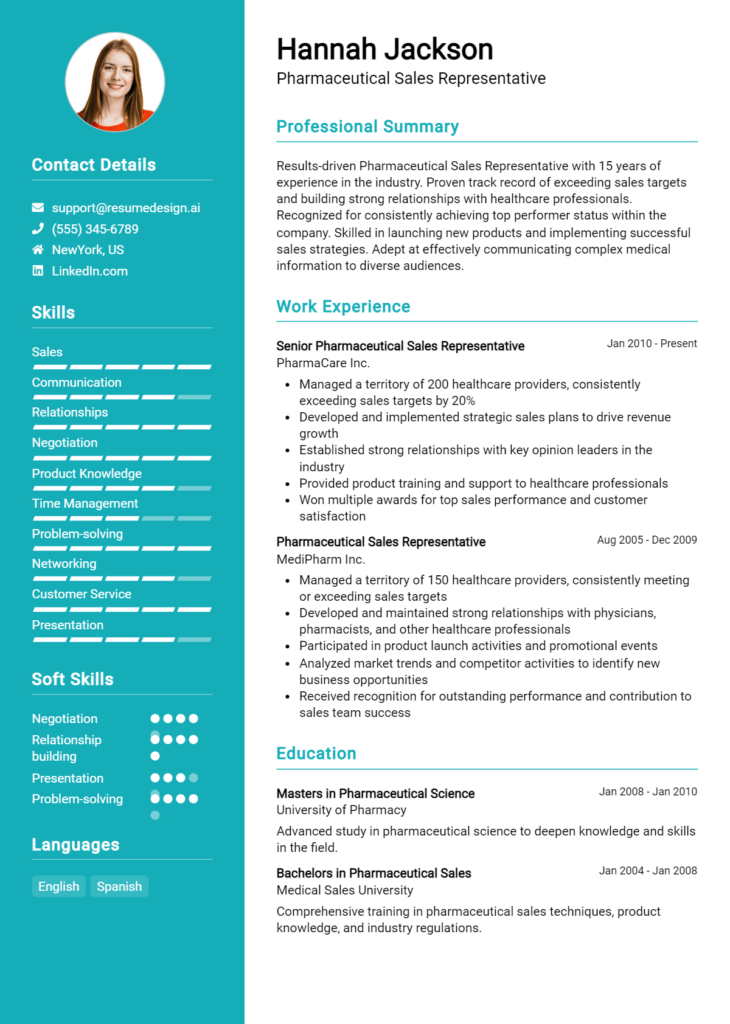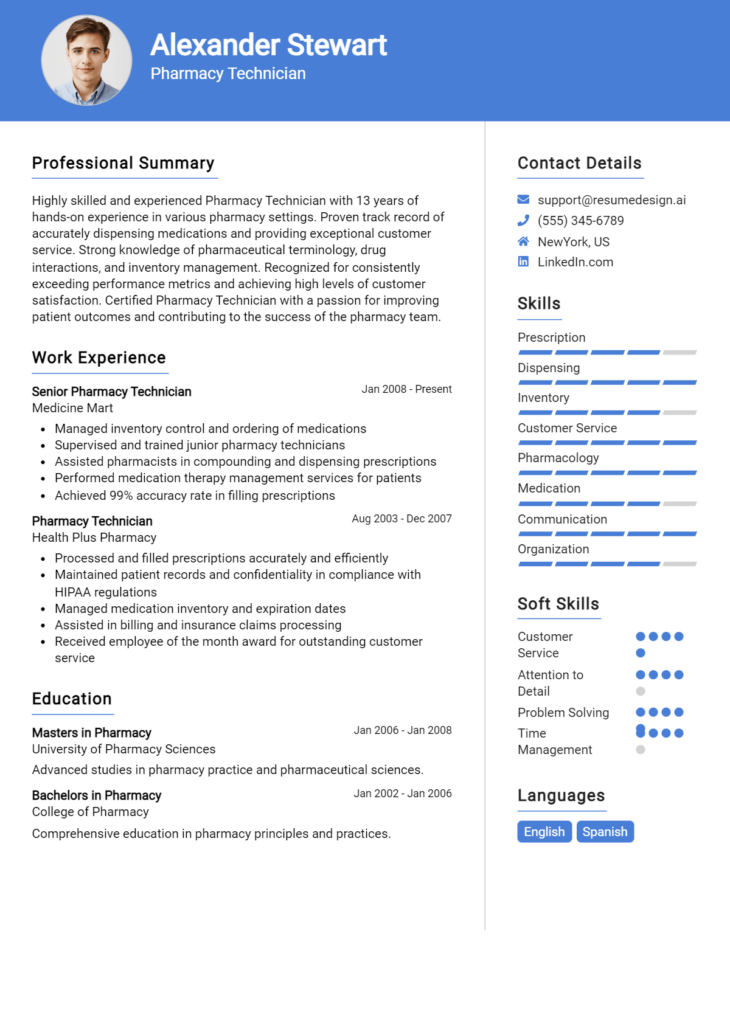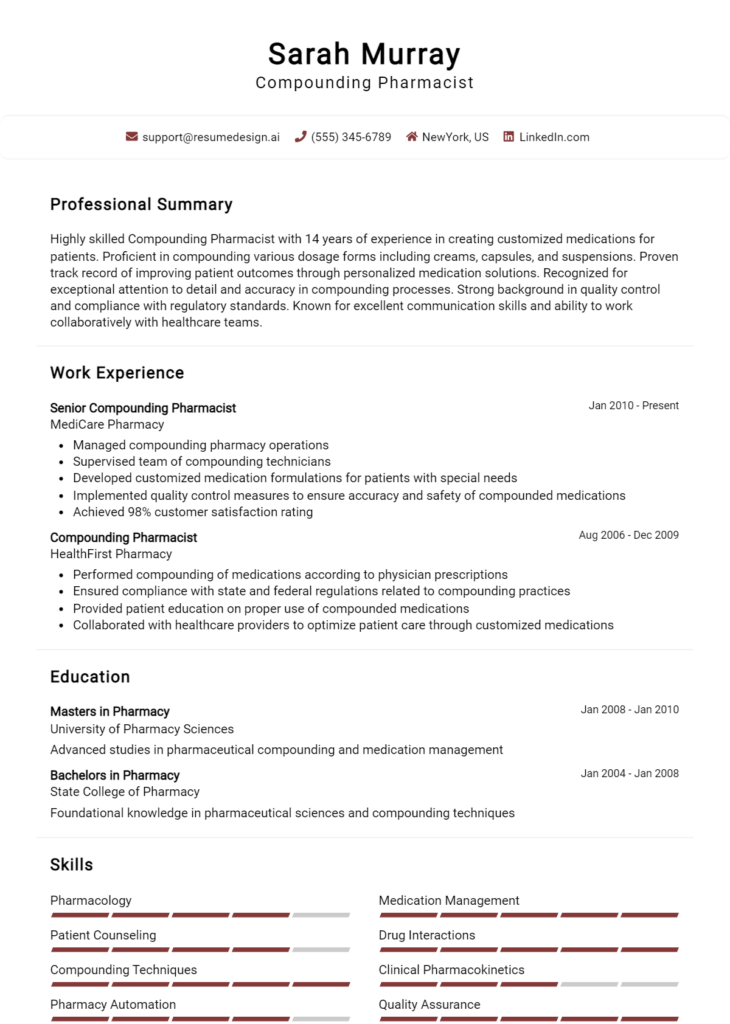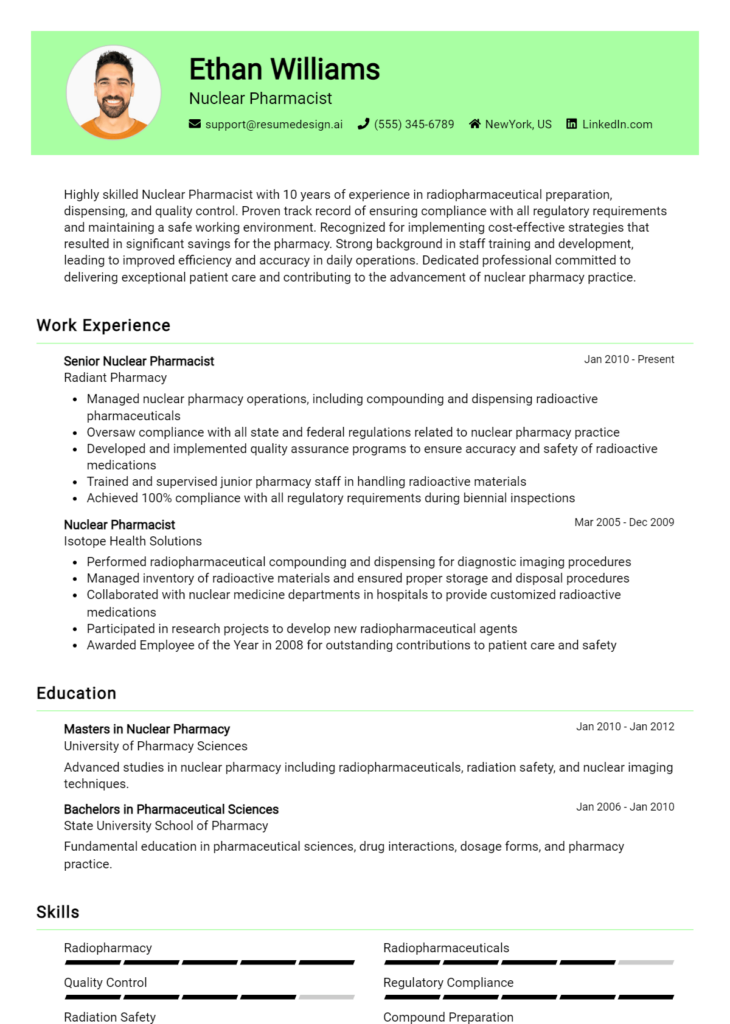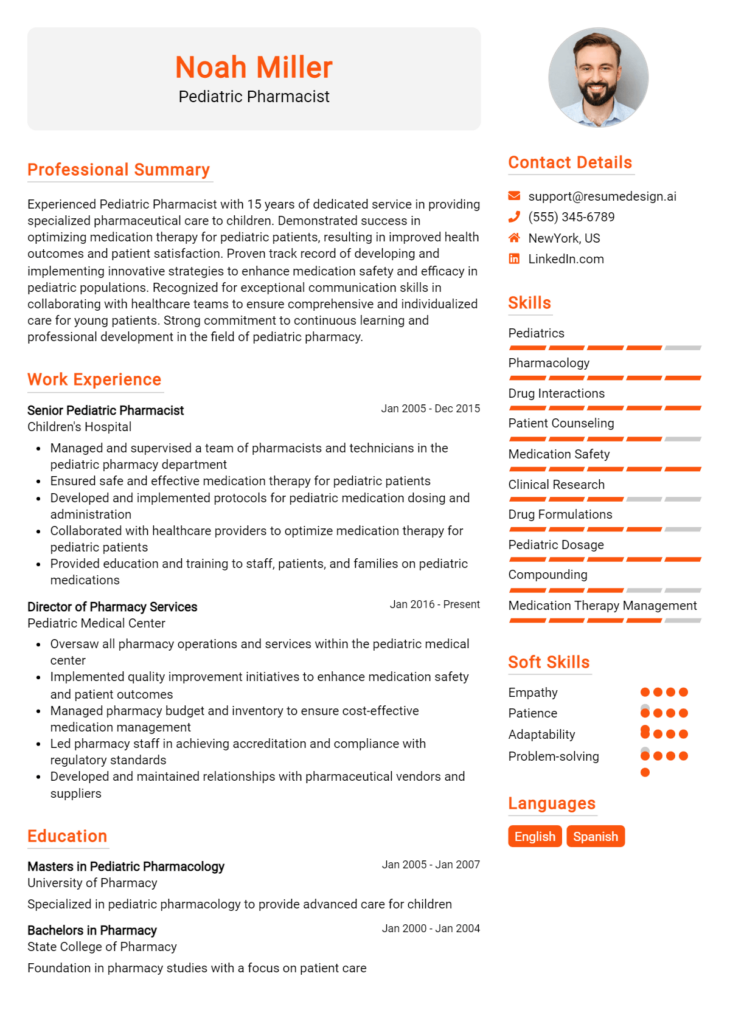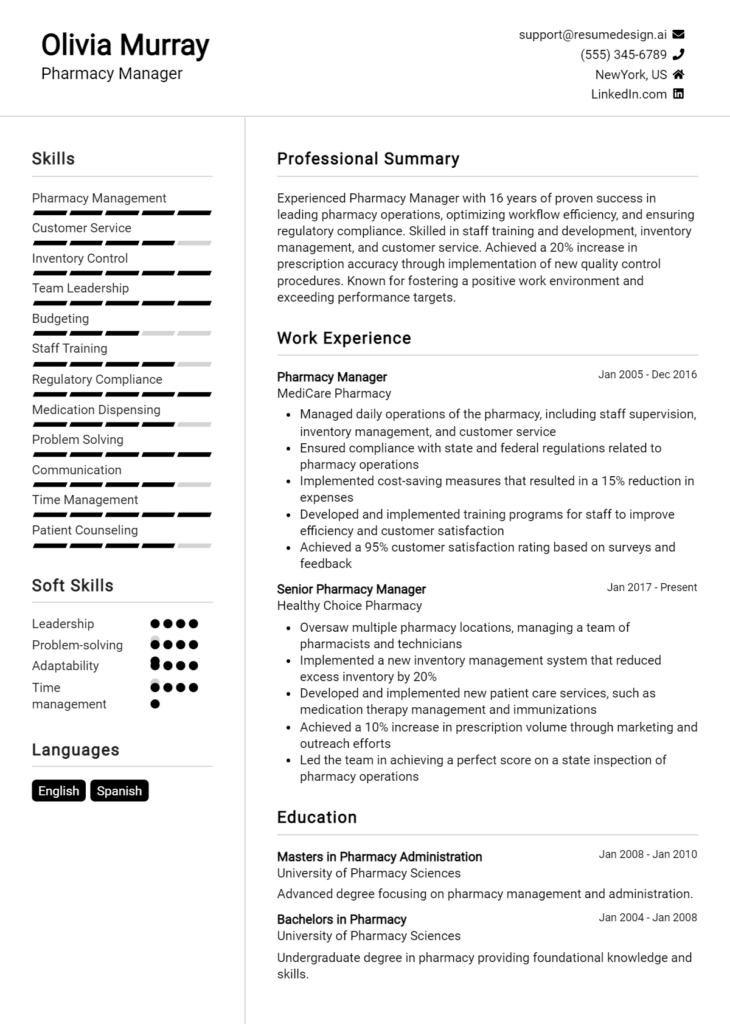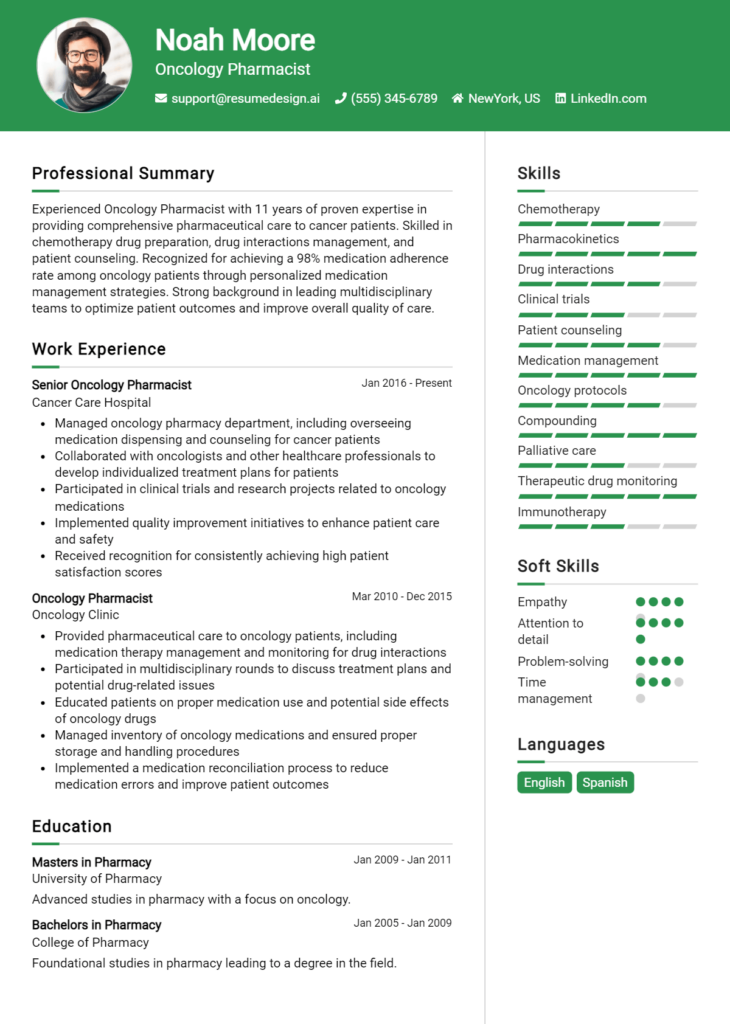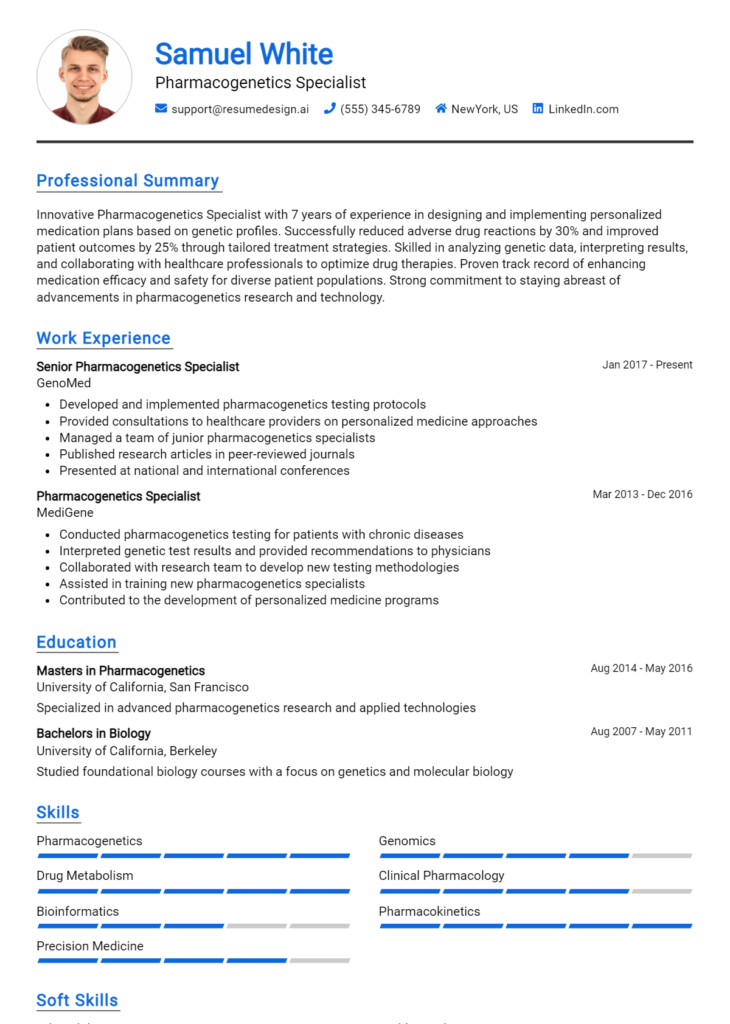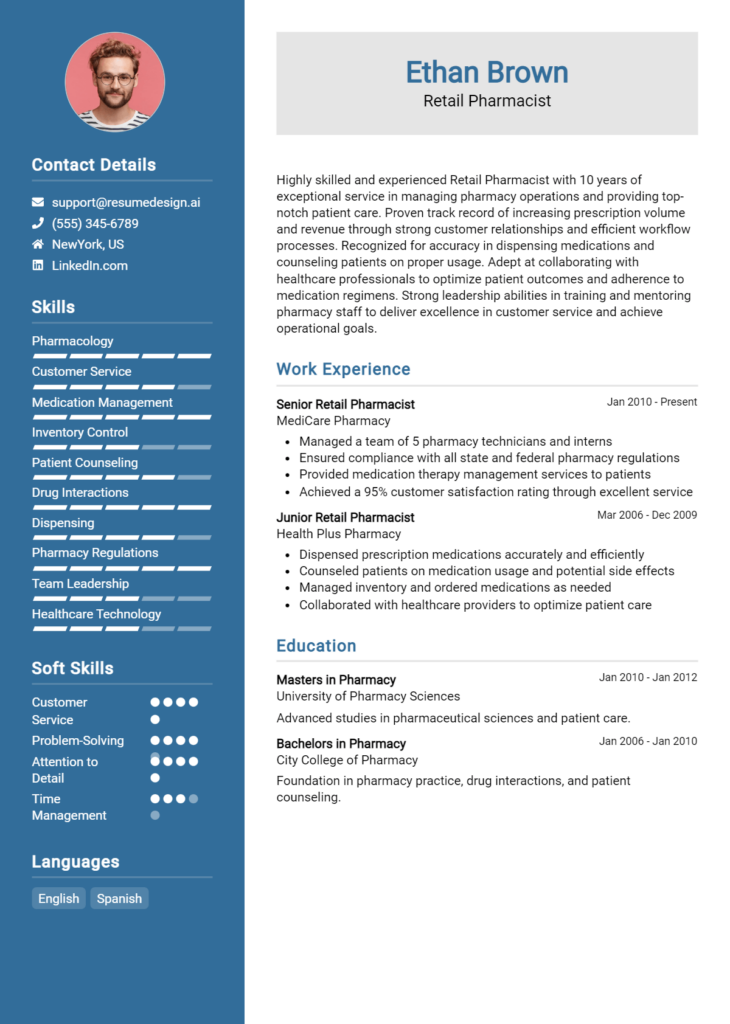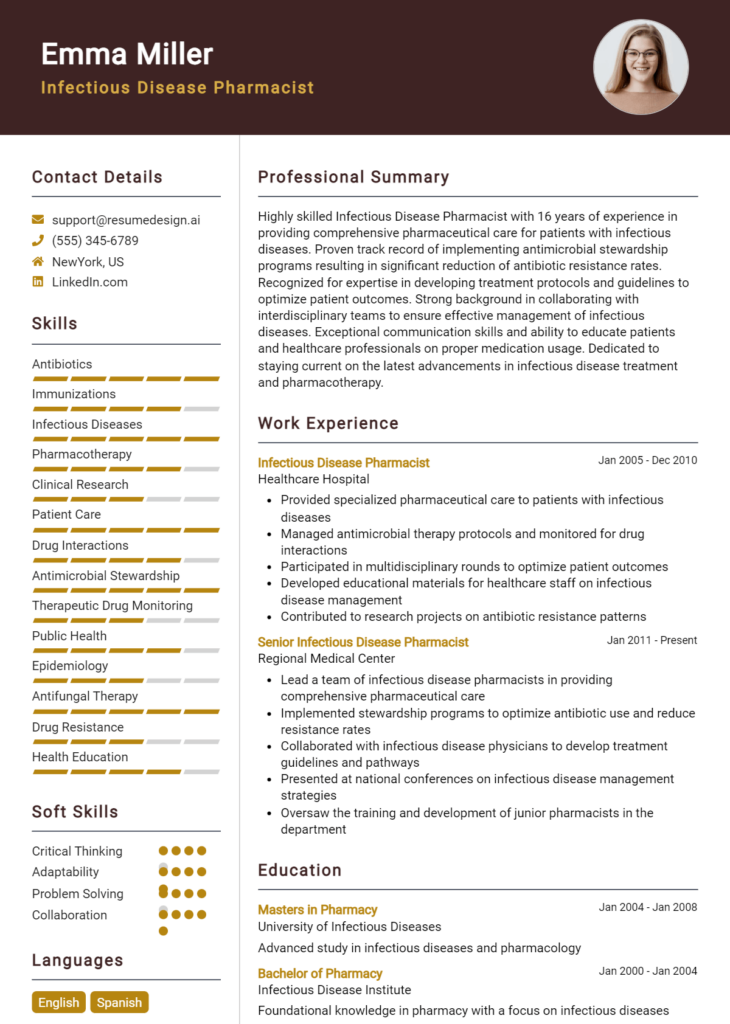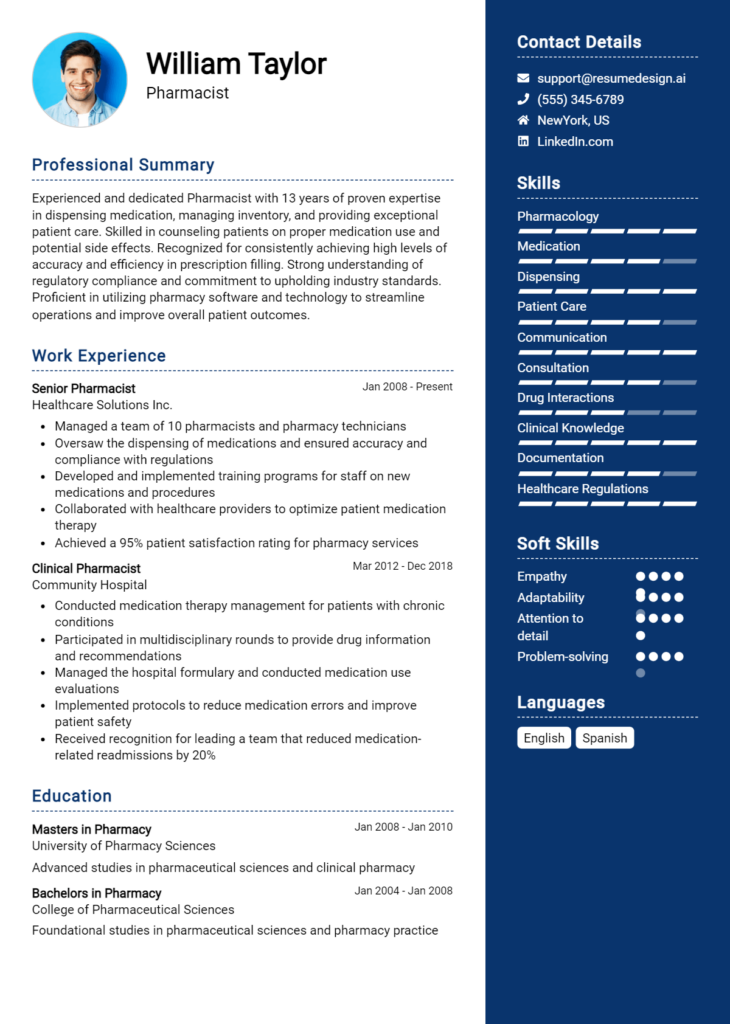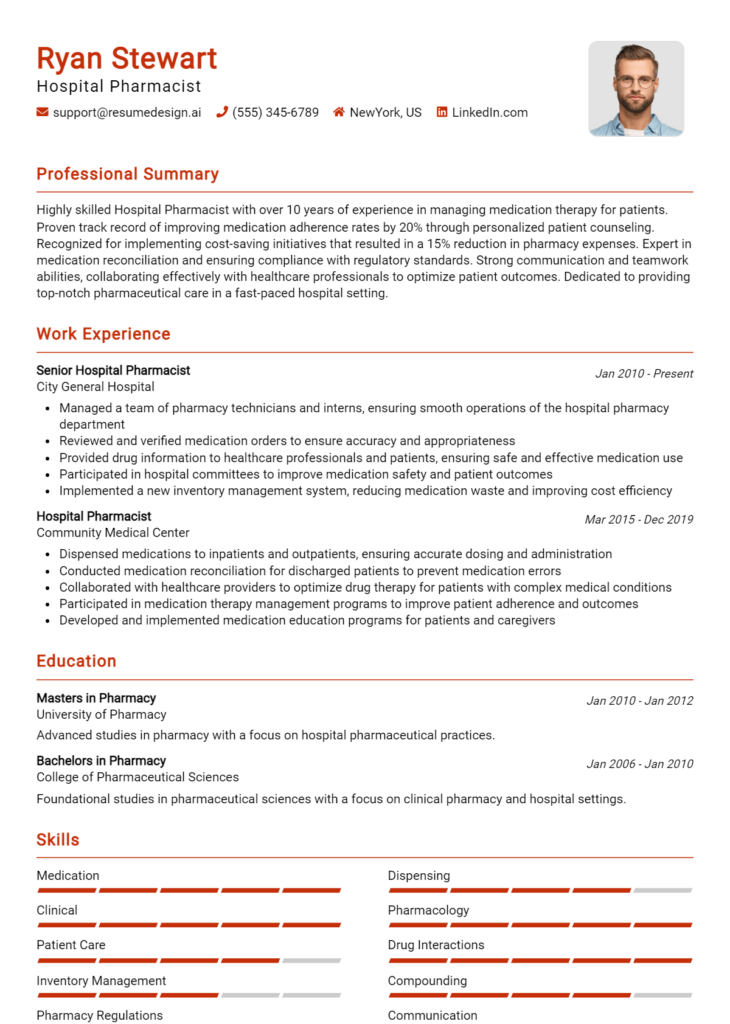Clinical Pharmacist Core Responsibilities
A Clinical Pharmacist plays a vital role in healthcare, bridging the gap between medical staff, patients, and pharmacy operations. Key responsibilities include reviewing medication therapy, providing drug information, and conducting patient assessments. Essential skills encompass strong technical knowledge, operational efficiency, and advanced problem-solving abilities, all of which support the organization’s goals of optimal patient care and safety. A well-structured resume effectively highlights these qualifications, showcasing the candidate's ability to enhance interdisciplinary collaboration and improve health outcomes.
Common Responsibilities Listed on Clinical Pharmacist Resume
- Conduct medication therapy management and patient counseling.
- Review and interpret medication orders for safety and efficacy.
- Collaborate with healthcare teams to optimize pharmacotherapy.
- Monitor patient outcomes and adjust medication regimens as necessary.
- Provide drug information and education to healthcare professionals and patients.
- Prepare and dispense medications accurately and efficiently.
- Participate in clinical rounds and contribute to patient care discussions.
- Ensure compliance with regulatory and safety standards.
- Develop and implement protocols for medication use.
- Conduct research and clinical trials to advance pharmacy practice.
- Train and mentor pharmacy staff and students.
High-Level Resume Tips for Clinical Pharmacist Professionals
A well-crafted resume is crucial for Clinical Pharmacist professionals looking to make a lasting impression on potential employers. In a competitive job market, your resume often serves as your first point of contact with hiring managers, making it essential to present a document that not only reflects your skills and achievements but also aligns closely with the specific needs of the job. A thoughtfully constructed resume can help you stand out among a sea of candidates by clearly demonstrating your qualifications and the value you bring to a healthcare team. This guide will provide practical and actionable resume tips tailored specifically for Clinical Pharmacist professionals, ensuring you make the most of your first impression.
Top Resume Tips for Clinical Pharmacist Professionals
- Tailor your resume to match the job description by using relevant keywords and phrases that reflect the specific requirements of the position.
- Highlight your relevant experience in clinical settings, including internships, rotations, and previous positions held in pharmacy practice.
- Quantify your achievements where possible, such as by detailing the percentage of medication adherence improvements or cost savings realized through your interventions.
- Showcase industry-specific skills, such as knowledge of pharmacotherapy, medication management, and patient counseling techniques.
- Include any certifications or licenses, such as Board Certification in Pharmacotherapy (BCPS) or state licensure, to demonstrate your qualifications.
- Utilize a clean and professional format that enhances readability and emphasizes key information without overwhelming the reader.
- Incorporate a summary statement that succinctly encapsulates your professional background, skills, and career objectives.
- List continuing education credits and training that demonstrate your commitment to professional development and staying current in the field.
- Highlight any collaborative work with healthcare teams, showcasing your ability to communicate effectively and contribute to patient care.
By implementing these tips, you can significantly enhance your resume's effectiveness, ultimately increasing your chances of landing a job in the Clinical Pharmacist field. A well-structured and targeted resume not only showcases your qualifications but also conveys your professionalism and dedication to providing exceptional healthcare.
Why Resume Headlines & Titles are Important for Clinical Pharmacist
In the competitive field of pharmacy, the role of a Clinical Pharmacist is critical for ensuring patient safety and optimizing medication therapy. A well-crafted resume headline or title is an essential component of a Clinical Pharmacist's resume, as it serves as the first impression for hiring managers. A strong headline can immediately capture attention while succinctly summarizing a candidate's key qualifications, such as specialized skills, relevant experience, or notable accomplishments. It should be concise, relevant, and directly related to the job being applied for, effectively setting the tone for the rest of the resume and paving the way for a successful application.
Best Practices for Crafting Resume Headlines for Clinical Pharmacist
- Keep it concise: Aim for one impactful phrase that encapsulates your qualifications.
- Be specific: Use terminology that relates directly to the Clinical Pharmacist role.
- Highlight key strengths: Focus on your most important skills or achievements relevant to the position.
- Use action words: Start with dynamic verbs to convey your proactive approach to pharmacy practice.
- Tailor to the job: Customize your headline for each application to align with the job description.
- Include relevant certifications: Mention any specific credentials that enhance your qualifications.
- Avoid jargon: Use clear language that hiring managers can easily understand.
- Emphasize impact: Highlight how your skills can benefit the organization and improve patient outcomes.
Example Resume Headlines for Clinical Pharmacist
Strong Resume Headlines
"Patient-Centered Clinical Pharmacist with 5+ Years of Experience in Anticoagulation Management"
“Board-Certified Clinical Pharmacist Specializing in Oncology Medications and Patient Education”
“Dedicated Clinical Pharmacist with Proven Track Record in Reducing Adverse Drug Events”
“Expert Clinical Pharmacist Offering Comprehensive Medication Therapy Management and Patient-Care Solutions”
Weak Resume Headlines
“Pharmacist Looking for Job”
“Experienced Healthcare Professional”
The strong headlines are effective because they are specific, relevant, and demonstrate the candidate's value to potential employers. They immediately convey essential qualifications and areas of expertise that align with the role of a Clinical Pharmacist. Conversely, the weak headlines fail to impress as they lack specificity and do not provide any insight into the candidate's unique strengths or experiences. By avoiding generic phrases, candidates can better position themselves in the competitive job market.
Writing an Exceptional Clinical Pharmacist Resume Summary
A resume summary is a crucial component of a Clinical Pharmacist's job application, serving as a powerful tool to quickly capture the attention of hiring managers. In a field where precision, expertise, and patient care are paramount, a strong summary succinctly highlights key skills, relevant experience, and notable accomplishments that align with the specific job role. This brief yet impactful overview not only sets the tone for the entire resume but also provides a compelling introduction that encourages the hiring manager to read further. Tailored to the job description, a well-crafted summary can differentiate a candidate from the competition and emphasize their suitability for the role.
Best Practices for Writing a Clinical Pharmacist Resume Summary
- Quantify Achievements: Use numbers to showcase your impact, such as the number of patients managed or medication errors reduced.
- Highlight Relevant Skills: Focus on key competencies such as clinical assessment, medication therapy management, and patient counseling.
- Tailor to Job Description: Customize your summary to reflect the specific requirements and keywords mentioned in the job posting.
- Be Concise: Keep your summary to 2-4 sentences, ensuring it is direct and to the point.
- Showcase Certifications: Mention relevant certifications, such as Board Certified Pharmacotherapy Specialist (BCPS), that enhance your qualifications.
- Emphasize Team Collaboration: Highlight your experience working with healthcare teams to improve patient outcomes.
- Include Professional Experience: Briefly mention your years of experience in various settings, such as hospitals or outpatient clinics.
- Demonstrate Passion for Patient Care: Convey your commitment to improving patient health and safety through effective medication management.
Example Clinical Pharmacist Resume Summaries
Strong Resume Summaries
Dedicated Clinical Pharmacist with over 7 years of experience in acute care settings, successfully reducing medication errors by 30% through comprehensive patient counseling and interdisciplinary collaboration. Board Certified Pharmacotherapy Specialist (BCPS) skilled in optimizing medication regimens for diverse patient populations.
Results-oriented Clinical Pharmacist with a proven track record of enhancing patient outcomes, having managed medication therapy for over 1,500 patients annually. Expertise in pharmacokinetics and drug interactions, with a focus on implementing evidence-based protocols that improved adherence rates by 25%.
Compassionate Clinical Pharmacist with 5 years of experience in outpatient settings, recognized for increasing patient satisfaction scores by 40% through personalized medication management plans. Proficient in electronic health record systems and committed to continuous professional development.
Weak Resume Summaries
Experienced pharmacist looking to contribute to a healthcare team. Strong background in pharmaceuticals and patient care.
Pharmacist with knowledge of medications and patient interactions. Seeking a position in a pharmacy environment.
The strong resume summaries stand out because they provide specific, quantifiable achievements and relevant skills that directly relate to the Clinical Pharmacist role. They illustrate the candidate's impact and expertise in a focused manner. In contrast, the weak resume summaries lack detail and fail to convey the candidate's unique value, making them generic and unmemorable. These examples highlight the importance of being specific and tailored in a professional summary to attract the attention of hiring managers.
Work Experience Section for Clinical Pharmacist Resume
The work experience section of a Clinical Pharmacist resume is critical for demonstrating a candidate's professional capabilities and contributions to the healthcare field. It not only highlights the technical skills acquired through various roles but also illustrates the ability to lead teams and ensure the delivery of high-quality pharmaceutical products. By quantifying achievements and aligning previous experiences with industry standards, candidates can effectively convey their value to potential employers, showcasing their readiness to handle the complex responsibilities that come with the role of a Clinical Pharmacist.
Best Practices for Clinical Pharmacist Work Experience
- Clearly outline specific technical skills relevant to pharmacy practice, such as medication therapy management and patient counseling.
- Quantify achievements with metrics, such as percentage improvements in patient outcomes or cost savings achieved through effective medication management.
- Highlight collaborative efforts with healthcare teams, including physicians and nursing staff, to enhance patient care.
- Use action verbs to describe responsibilities and accomplishments, showcasing proactive involvement in projects and initiatives.
- Tailor descriptions to reflect industry standards and expectations, ensuring relevance to the Clinical Pharmacist role.
- Include any leadership roles or mentoring experiences that demonstrate the ability to guide and support junior pharmacists or pharmacy technicians.
- Focus on continuing education and professional development efforts that underscore commitment to staying current in the field.
- Maintain a clear and organized format, making it easy for hiring managers to review experience at a glance.
Example Work Experiences for Clinical Pharmacist
Strong Experiences
- Led a multidisciplinary team in a quality improvement project that reduced medication errors by 30% over six months, enhancing patient safety and care quality.
- Implemented a new medication therapy management program that resulted in a 25% increase in patient adherence rates, contributing to improved health outcomes.
- Collaborated with physicians to develop a standardized protocol for anticoagulation therapy, which decreased adverse events by 15% within the first year.
- Trained and mentored a team of 5 pharmacy interns, equipping them with essential clinical skills and improving their overall performance ratings by 20%.
Weak Experiences
- Responsible for managing pharmacy operations without specifying any metrics or achievements.
- Worked with patients to provide medication advice, but without detailing the impact or outcomes of this interaction.
- Helped in the pharmacy but did not elaborate on specific contributions or improvements made during the experience.
- Participated in team meetings and discussions without indicating how those contributions led to positive changes or results.
The examples above illustrate the distinction between strong and weak experiences based on their specificity and impact. Strong experiences showcase quantifiable results, highlight leadership and collaboration, and provide clear evidence of the candidate's contributions to patient care and pharmacy operations. In contrast, weak experiences lack detail and fail to demonstrate the candidate's effectiveness or the outcomes of their efforts, making it challenging for potential employers to see their value.
Education and Certifications Section for Clinical Pharmacist Resume
The education and certifications section of a Clinical Pharmacist resume plays a crucial role in establishing the candidate's professional qualifications and expertise. This section not only showcases the academic background but also highlights industry-relevant certifications and the commitment to continuous learning that is essential in the ever-evolving field of pharmacy. By detailing relevant coursework, specialized training, and certifications, candidates can enhance their credibility and demonstrate their alignment with the job role, making them stand out to potential employers.
Best Practices for Clinical Pharmacist Education and Certifications
- Prioritize relevant degrees in pharmacy, such as a Doctor of Pharmacy (Pharm.D.) or Bachelor of Pharmacy (B.Pharm).
- Include certifications from recognized organizations, such as Board Certified Pharmacotherapy Specialist (BCPS) or Certified Diabetes Educator (CDE).
- Highlight any specialized training in areas like oncology, geriatrics, or infectious diseases.
- Detail relevant coursework that applies directly to the position and demonstrates expertise.
- Keep the information precise and focused on qualifications that enhance job suitability.
- Update the section regularly to reflect new certifications or educational achievements.
- Use clear formatting to improve readability, making it easy for hiring managers to find key information.
- Consider including continuing education courses that showcase ongoing professional development.
Example Education and Certifications for Clinical Pharmacist
Strong Examples
- Doctor of Pharmacy (Pharm.D.), University of California, San Francisco, 2020
- Board Certified Pharmacotherapy Specialist (BCPS), Pharmacy Specialty Certification Board, 2021
- Advanced Pharmacy Practice Experience (APPE) in Oncology, 2019
- Certificate in Diabetes Management, American Pharmacists Association, 2022
Weak Examples
- Bachelor of Arts in English Literature, University of XYZ, 2015
- Certified Personal Trainer, National Academy of Sports Medicine, 2018
- Online Course in Basic Computer Skills, 2019
- Certificate in Event Planning, Community College, 2020
The strong examples are considered effective because they directly relate to the candidate's qualifications for the Clinical Pharmacist role, showcasing relevant degrees and certifications that enhance their expertise in pharmacy. In contrast, the weak examples highlight qualifications that are either irrelevant to the pharmacy field or do not add value to the candidate's professional profile, thus failing to support their application for a Clinical Pharmacist position.
Top Skills & Keywords for Clinical Pharmacist Resume
As a Clinical Pharmacist, the role encompasses a broad range of responsibilities that require a unique combination of both hard and soft skills. These skills are essential not only for effectively managing medication therapies but also for collaborating with healthcare teams to optimize patient outcomes. When crafting a resume, highlighting the right skills can significantly enhance the chances of standing out to potential employers. Skills such as communication, problem-solving, and attention to detail are crucial, alongside technical knowledge of pharmaceuticals and regulations. By showcasing these competencies, candidates can illustrate their ability to impact patient care positively and navigate the complexities of the healthcare environment.
Top Hard & Soft Skills for Clinical Pharmacist
Soft Skills
- Excellent Communication Skills
- Empathy and Compassion
- Problem-Solving Abilities
- Attention to Detail
- Team Collaboration
- Time Management
- Adaptability
- Critical Thinking
- Active Listening
- Conflict Resolution
Hard Skills
- Comprehensive Knowledge of Pharmacology
- Medication Therapy Management
- Familiarity with Pharmacy Software
- Regulatory Compliance Expertise
- Drug Interaction Knowledge
- Patient Counseling Techniques
- Clinical Research Skills
- Compounding Skills
- Inventory Management
- Data Analysis and Interpretation
For more insights on how to effectively showcase your skills and work experience, consider reviewing additional resources that can help you refine your resume to reflect your qualifications as a Clinical Pharmacist.
Stand Out with a Winning Clinical Pharmacist Cover Letter
Dear Hiring Manager,
I am writing to express my interest in the Clinical Pharmacist position at [Company Name] as advertised on [Job Board/Company Website]. With a Doctor of Pharmacy degree from [University Name] and over [X years] of experience in clinical pharmacy settings, I am confident in my ability to contribute effectively to your healthcare team. My extensive background in medication management, patient counseling, and interdisciplinary collaboration has equipped me with the skills necessary to enhance patient care and safety at [Company Name].
In my previous role at [Previous Employer], I actively participated in patient care rounds, collaborating with physicians and nurses to optimize pharmacotherapy for diverse patient populations. I have a strong track record of conducting thorough medication reviews, identifying drug interactions, and developing individualized medication plans that align with each patient’s unique needs. My commitment to continuous education and staying current with the latest pharmaceutical developments ensures that I provide evidence-based recommendations and guidelines to both patients and healthcare professionals.
I am particularly drawn to the mission of [Company Name] to provide high-quality, patient-centered care. I am excited about the opportunity to leverage my clinical expertise to improve medication adherence and therapeutic outcomes. I am adept at utilizing electronic health records and other technology to enhance patient education and follow-up care, which I believe aligns with your organization’s goals of promoting comprehensive healthcare solutions. I would be honored to bring my passion for pharmacy practice and dedication to patient advocacy to your esteemed team.
Thank you for considering my application. I am looking forward to the opportunity to discuss how my skills and experiences align with the needs of your department. I hope to contribute to [Company Name] in delivering exceptional pharmaceutical care and improving patient health outcomes. Please feel free to contact me at [Your Phone Number] or [Your Email] to schedule a conversation.
Sincerely,
[Your Name]
Common Mistakes to Avoid in a Clinical Pharmacist Resume
When crafting a resume as a Clinical Pharmacist, it's essential to present your qualifications and experience in a way that stands out to potential employers. However, many candidates make common mistakes that can undermine their chances of landing an interview. By avoiding these pitfalls, you can create a more polished and effective resume that highlights your skills and expertise in the field. Below are some prevalent errors to be mindful of:
Ignoring Keywords: Failing to include relevant keywords from the job description can lead to your resume being overlooked by Applicant Tracking Systems (ATS) that many employers use to filter candidates.
Lack of Specificity: Using vague language when describing your duties or accomplishments can diminish the impact of your experience. Instead, quantify your achievements with specific metrics or outcomes.
Inconsistent Formatting: A resume that lacks consistent formatting can be distracting and unprofessional. Ensure uniformity in font style, size, and bullet point usage to create a clean, organized appearance.
Overloading with Jargon: While it’s important to demonstrate your expertise, excessive use of technical jargon can alienate hiring managers who may not be familiar with specialized terms. Aim for a balance that showcases your knowledge while remaining accessible.
Neglecting Soft Skills: Focusing solely on technical skills and qualifications can give an incomplete picture. Clinical pharmacists also require strong communication and interpersonal skills; be sure to highlight these attributes.
Omitting Continuing Education: In the rapidly evolving field of pharmacy, ongoing education is crucial. Failing to mention relevant certifications, courses, or training can make your resume less competitive.
Not Tailoring the Resume: Submitting a generic resume for multiple positions can be a missed opportunity. Tailor your resume for each application by emphasizing the skills and experiences that align with the specific role.
Leaving Out Relevant Experience: Some candidates may overlook including volunteer work, internships, or other relevant experiences that can showcase their commitment and versatility. Every experience can contribute to your qualifications, so don’t underestimate its value.
Conclusion
As a Clinical Pharmacist, your role encompasses a variety of responsibilities including medication management, patient education, and collaborating with healthcare teams to ensure optimal therapeutic outcomes. Throughout the article, we explored the essential skills and qualifications required for this position, emphasizing the importance of clinical expertise, communication skills, and a strong understanding of pharmacotherapy.
Additionally, we highlighted how staying current with industry trends and continuing education can enhance your effectiveness in this vital role. As you reflect on the insights shared, it’s crucial to ensure that your Clinical Pharmacist resume effectively showcases your qualifications and experiences.
We encourage you to take the next step in your career by reviewing and refining your resume. Utilize available resources such as resume templates, which can help you structure your information effectively. Consider using a resume builder to streamline the process and customize your resume to fit your unique skills. Additionally, browsing through resume examples can provide you with inspiration and ideas on how to present your accomplishments. Don’t forget the importance of a strong introduction; check out our cover letter templates to complement your application.
Take action now and ensure your resume stands out in the competitive field of clinical pharmacy!

